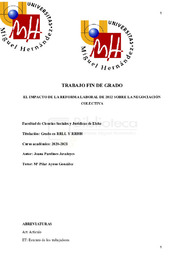Por favor, use este identificador para citar o enlazar este ítem:
https://hdl.handle.net/11000/26274Registro completo de metadatos
| Campo DC | Valor | Lengua/Idioma |
|---|---|---|
| dc.contributor.advisor | Ayuso González, María Pilar | - |
| dc.contributor.author | Pardines Javaloyes, Joana | - |
| dc.contributor.other | Departamentos de la UMH::Ciencias Sociales y Humanas | es_ES |
| dc.date.accessioned | 2022-03-22T12:41:56Z | - |
| dc.date.available | 2022-03-22T12:41:56Z | - |
| dc.date.created | 2021-08 | - |
| dc.identifier.uri | http://hdl.handle.net/11000/26274 | - |
| dc.description.abstract | Debido a la situación económica que estaba atravesando España en el año 2008 y los efectos que la crisis estaba teniendo sobre el desempleo, el Gobierno tuvo que tomar medidas urgentes para paliar los efectos de dicha crisis. Con la aprobación de la reforma laboral del año 2012, hubo cambios en el marco jurídico que se había establecido con la reforma del ET realizado por la Ley 11/1994, este cambio ya se inició con las reformas anteriores de 2010 y 2011. Con esta reforma de 2012 se ven muy afectadas tanto la evolución como las características de la negociación colectiva, además de los cambios directos de la regulación de los convenios colectivos, donde se establece prioridad de aplicación a favor de los convenios de empresa frente a los de ámbito superior y, de esta forma, descentralizar dicho sistema y limitar el tiempo de ultraactividad de los convenios a un año. Lo que se pretendía con esta reforma es combatir la situación de crisis, estableciendo mayor poder al empresario y a su vez desprotegiendo al trabajador | es_ES |
| dc.description.abstract | Because of the economic situation that Spain was going through in 2008 and the effects that the crisis was having on unemployment, the Government had to take urgent action to alleviate the effects of that crisis. With the adoption of the labour reform of 2012, decisively changing the legal framework that had been established with the reform of the ET carried out by Law 11/1994, this change already began with the previous reforms of 2010 and 2011. This 2012 reform is very affected by both the developments and the characteristics of collective bargaining, as well as the direct changes in the regulation of collective agreements, where priority of application is set in favour of enterprise agreements versus those of higher scope and, in this way, decentralize that system and limit the time of ultra activity of the agreements to one year. What was intended with this reform is to combat the crisis situation, establishing greater power for the entrepreneur and in turn protecting the worker | es_ES |
| dc.format | application/pdf | es_ES |
| dc.format.extent | 28 | es_ES |
| dc.language.iso | spa | es_ES |
| dc.publisher | Universidad Miguel Hernández de Elche | es_ES |
| dc.rights | info:eu-repo/semantics/openAccess | es_ES |
| dc.rights | Attribution-NonCommercial-NoDerivatives 4.0 Internacional | * |
| dc.rights.uri | http://creativecommons.org/licenses/by-nc-nd/4.0/ | * |
| dc.subject | negociación colectiva | es_ES |
| dc.subject.other | CDU::3 - Ciencias sociales::33 - Economía::331 - Trabajo. Relaciones laborales. Ocupación. Organización del trabajo | es_ES |
| dc.title | El impacto de la reforma laboral de 2012 sobre la negociación colectiva | es_ES |
| dc.type | info:eu-repo/semantics/bachelorThesis | es_ES |

Ver/Abrir:
TFG-Pardines Javaloyes, Joana.pdf
416,21 kB
Adobe PDF
Compartir:
 La licencia se describe como: Atribución-NonComercial-NoDerivada 4.0 Internacional.
La licencia se describe como: Atribución-NonComercial-NoDerivada 4.0 Internacional.
.png)